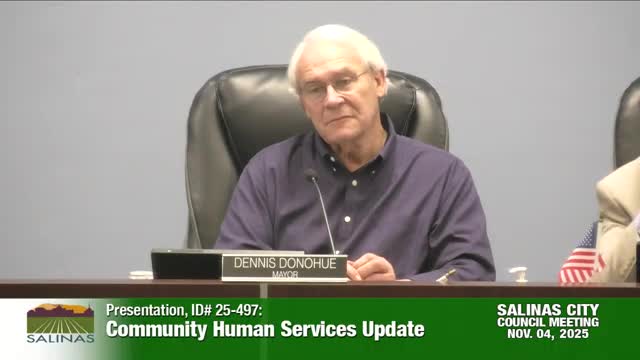Community Human Services outlines countywide mental-health, substance-use and homeless services; Salinas remains a major local client
Get AI-powered insights, summaries, and transcripts
Subscribe
Summary
Robin McCray, executive director of Community Human Services, presented program, staffing and funding details to the Salinas City Council, noting the nonprofit's countywide behavioral-health and homeless services and that Salinas residents accounted for roughly half of last year's service units.
Robin McCray, executive director of Community Human Services, told the Salinas City Council that the nonprofit's mission is "to provide high quality mental health, substance use, and homeless services to the residents of Monterey County to help everyone reach their full potential and lead happier, healthier lives." The agency presented an overview of programs, funding sources, and performance metrics.
McCray said the agency operates 20 programs at 30 sites countywide, and that the organization's $17.5 million annual budget leverages local joint-powers contributions (the city contribution cited as $33,500), Medi-Cal reimbursements, state and federal grants, contracts with behavioral health and probation, and private philanthropy. She told the council that the agency served roughly 4,500 mental-health clients and provided hundreds of thousands of service units last year. The presentation identified Salinas residents as receiving about 46% of the agency's service units and being more than half of the individuals served.
Programs described included DAISY (youth drug and alcohol intervention), outpatient treatment and medication-assisted treatment clinics, supervised visitation, domestic-violence services, transitional and low-barrier shelters, and youth navigation and outreach. McCray said the Share Center in Salinas is a 104-bed low-barrier navigation center and shelter and that staff provide 24-hour supervision, case management, and related services; food is provided under contract with a partner organization.
Councilmembers asked about age ranges served, whether the agency accepts walk-ins, gaps in South County representation on the joint powers authority, and reporting metrics (INR data). McCray said most programs accept walk-ins where possible, age bands are determined by funding sources, the agency cross-refers to South County partners, and that agency-wide service reporting can be produced for council review.
City staff clarified the city's current share of funding for the Share Center: the city and county are splitting support, and the city budget included about $1.8 million this fiscal year for Share Center funding; staff said the allocation is largely grant-funded and will be revisited during next year's budget process.
Councilmembers praised the agency's staff and asked staff to provide more detailed service and funding breakdowns; McCray offered to return with additional performance slides on request.
